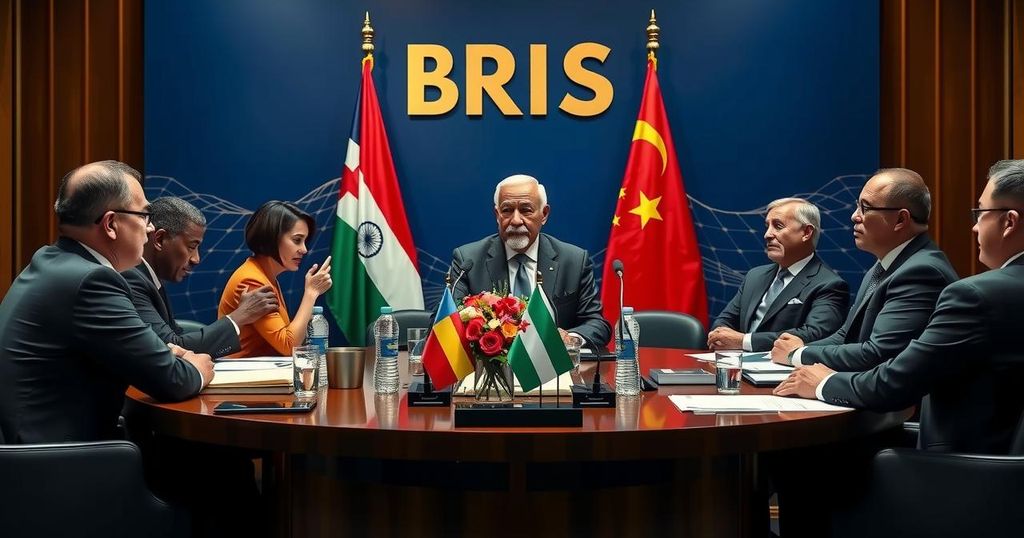Putin Hosts BRICS Summit to Forge a New Global Order Against West’s Dominance
Russian President Vladimir Putin has gathered over two dozen countries at the BRICS Summit to discuss a “new world order” aimed at reducing Western hegemony and dollar dominance. Notable discussions included strengthening relations between China and India, and addressing economic sanctions. The bloc aims to create alternatives to U.S.-dominated economic systems, although challenges remain in formulating concrete plans for such changes.
This week, President Vladimir Putin of Russia convened a significant gathering of over two dozen countries in Kazan, Russia, for the annual BRICS Summit, which focuses on establishing a “new world order” that seeks to diminish Western influence and the dominance of the U.S. dollar in global trade. This summit represents President Putin’s most prominent international platform since the initiation of Russia’s invasion of Ukraine in 2022. The discussions, which will transpire over three days, aim to lessen reliance on the U.S. dollar, primarily to circumvent economic sanctions imposed by the West. During the summit, President Putin articulated, “The dollar is being used as a weapon. We really see that this is so. I think that this is a big mistake by those who do this.” In a notable development, leaders from China and India, President Xi Jinping and Prime Minister Narendra Modi respectively, utilized this platform to signal their aspirations for improved relations, particularly after a recent agreement concluded a four-year military standoff over a territorial dispute in the Himalayas. The BRICS alliance, initially conceptualized by Goldman Sachs analysts, comprises Brazil, Russia, India, China, and South Africa, and has witnessed considerable expansion. New members, such as Iran, Egypt, Ethiopia, the United Arab Emirates, and Saudi Arabia were added in January, with further interest shown by countries like Turkey, Azerbaijan, Malaysia, and Pakistan. This coalition now represents approximately half of the world’s population and accounts for 35% of global economic output. Despite the growing influence of BRICS, some member states, including Egypt and the UAE, maintain military ties with the United States. The Russian administration perceives this summit as a substantial success, with 36 countries confirming their participation, as affirmed by Yuri Ushakov, Putin’s foreign policy aide. Concurrently, Russia is engaged in efforts to introduce an alternative payment system to circumvent SWIFT, a method extensively utilized to implement sanctions against Russian officials. While the summit emphasizes anti-Western sentiments, countries like Brazil, India, and South Africa advocate for a more constructive approach, focusing on reforms within international institutions such as the World Bank and International Monetary Fund, to better address the needs of developing nations. Notably, Iranian President Masoud Pezeshkian urged that BRICS must evolve beyond a mere “dialogue club,” emphasizing the necessity for tangible actions as many initial goals remain unattained. He criticized the Western powers for their frequent threats of sanctions, asserting that such a monopolistic approach has fostered violence and instability globally. Current estimates indicate that dollar assets constitute roughly 59% of global foreign currency reserves, a decline from 70% in 1999. Former U.S. President Donald Trump has previously warned that abandoning the dollar as the world’s primary currency could equate to a strategic defeat, asserting, “I was a user of sanctions, but I put them on and take them off as quickly as possible because ultimately it kills your dollar, and it kills everything the dollar represents. I think it would be losing a war if we lost the dollar as the world currency.”
The BRICS Summit convenes annually, bringing together major emerging economies which are characterized by their significant influence on regional and global affairs. Formed to enhance collaboration among its members, the bloc has gained traction among nations seeking alternatives to Western economic hegemony. Recent geopolitical tensions, particularly following military conflicts and international sanctions, have heightened the urgency for member states to establish a multi-polar world order, where they can collectively assert themselves against Western dominance.
The BRICS Summit represents a strategic collaboration of emerging economies determined to reshape global dynamics away from Western influence. Amidst discussions of creating alternatives to the U.S. dollar and establishing better relations among member nations, the summit highlights the growing desire for a new international order. However, the challenges of implementing these ambitious initiatives will require concerted efforts and clear plans from all parties involved. As nations navigate their interests in an increasingly polarized world, the success of BRICS will depend on its ability to provide practical solutions that cater to the needs of the Global South, while forging a united front against Western policies.
Original Source: www.foxnews.com




Post Comment